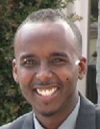 Education/Political leadership/Communication/Development
Education/Political leadership/Communication/Development
“Somalia once was a united country under one common value of justice and peace,” Mohamed Ahmed says of his homeland.
In studying Somalia’s history, Mohamed discovered Somalia was once Africa’s democratic role model where people respected each other’s beliefs. Then the warlords gained control, and every tribe wanted to be the ruling clan that governed the country, some even intending to destroy the others. “It is almost as if we lost all civility,” Mohamed says.
Somalia became a failed state, plagued with corruption and violence. Its civil war sent a diaspora to neighboring countries and other continents. Mohamed’s parents wanted to give him an education and opportunities, so they risked their lives to flee Mogadishu and make their way to Kenya. At every checkpoint, they had to lie about their tribe to keep the family from being killed on the spot. “I don’t know how my life would have been today, or even if I would be living if those warlords found that we were not in their tribe or clan.”
Fortunately, they reached the U.S., and throughout Mohamed’s school years, he reflected on what his mother and father had to sacrifice for his sake. He studied hard and stayed after school daily to improve his language skills in preparation for college. Once in college, he studied International Security and Conflict Resolution, aiming to return to Somalia and help it transition from conflict to peace. “I think we need individuals who have the skill sets and capabilities to look at the issue in depth and from a macro perspective in order to reach conclusions that are optimal for that community or country,” Mohamed says.
He sees good leadership as the first priority and points out that Somalia’s leaders today are considered to be among the most corrupt and incompetent in the world. “Somali community leaders are still using tribal and clan rhetoric to play the blame game and fragment the community. I think that conflict blurs people’s vision in that they lose sight of what is important in the long run. They pick up arms and weapons to get their point across.” If greater educational opportunities open up, communication and tolerance of public debate must be emphasized.
“Education cannot be stressed enough,” Mohamed says, “to help lift Somalia out of poverty and drive development. Investing early is crucial.” Drought combines with extreme poverty, however, to render education virtually impossible without assistance. For example, in the town of Xaar Xaar, a hospital and school were built which had to be abandoned due to a drought. The inhabitants migrated to Burtinle which has water, a secondary school, and assistance from C.U.R.E Africa, (Communities United Reviving East Africa) whose mission is to strengthen the educational opportunities of East African communities both nationally and internationally.
Mohamed founded C.U.R.E. and recently returned from Somalia where he helped research the educational system. They have raised $30,000 toward the Burtinle elementary school in the Puntland region. C.U.R.E. Africa tutors, mentors students with SATs and ACTs, and hosts awareness programs, cultural celebrations, and events with the larger community to change negative perceptions of East Africa. Another goal is to bring water into the region by digging wells. The group seeks financial support from regional government, and other fundraising efforts with a goal of sustainability.
A recent graduate of San Diego State University—which made his parents proud— Mohamed hopes to continue on into graduate school. He sees himself working in education for the rest of his life, but he’s also passionate about politics and is currently an intern for Congressman Juan Vargas. He dreams of becoming president of Somalia one day, a new kind of leader who is academic, visionary, skilled, trustworthy, and able to move the country ahead responsibly.
“I would like Africa to give to the rest of the world,” he says.
